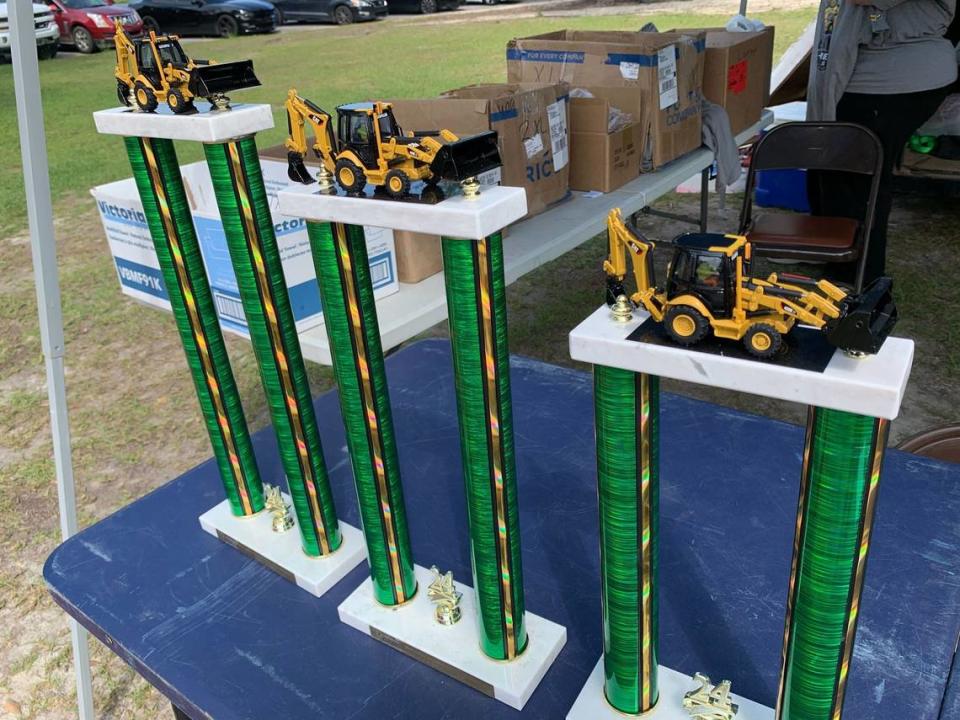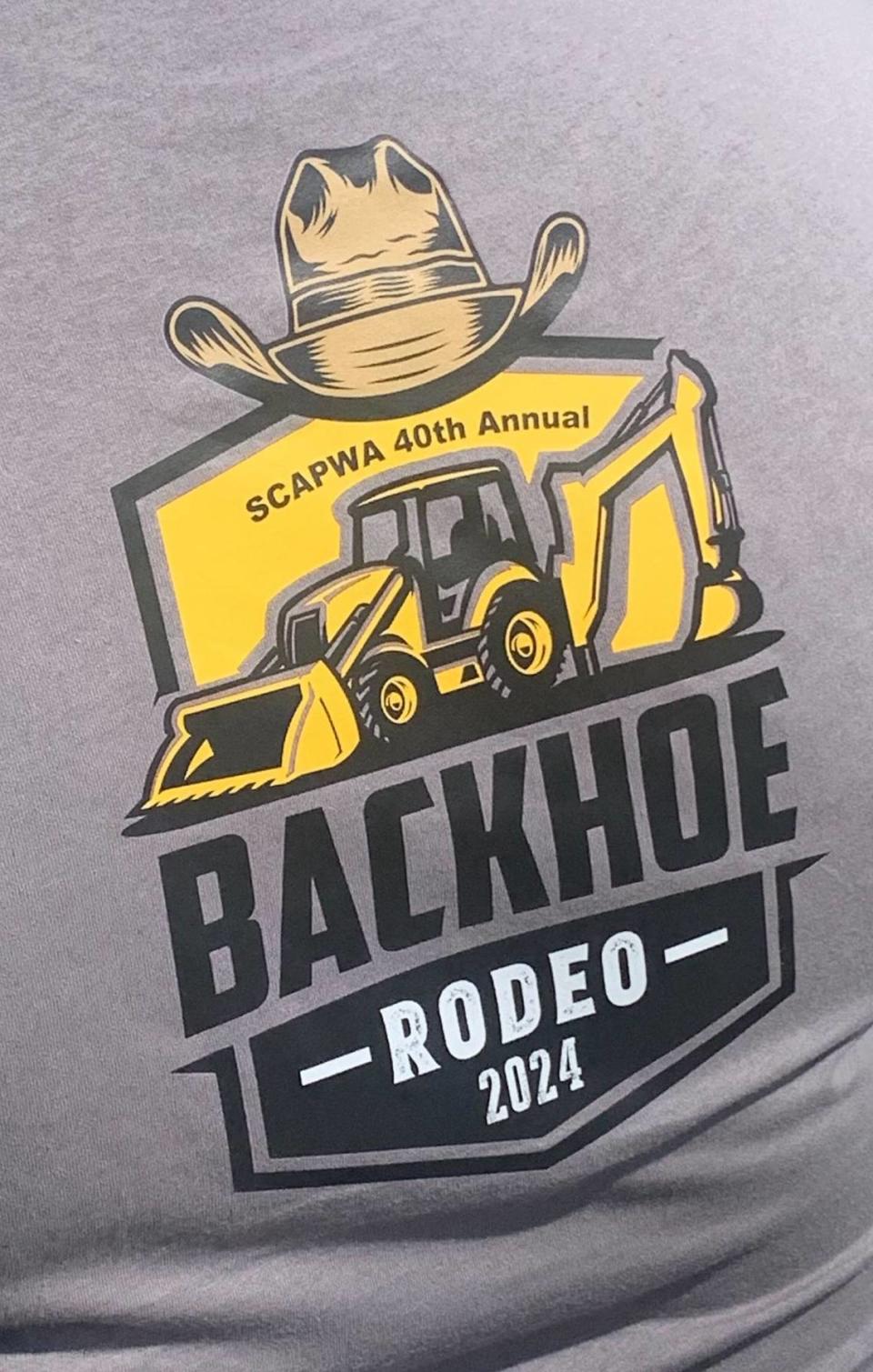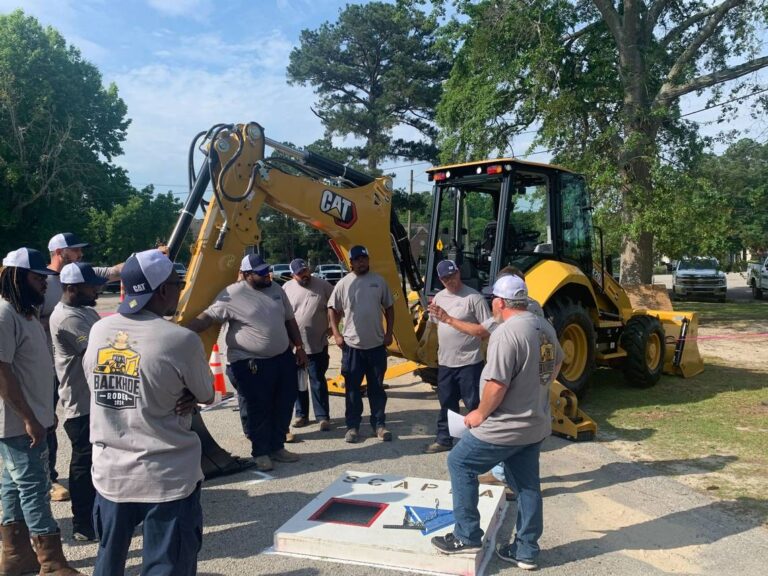Clifton Carr climbs into the driver’s seat of the eight-ton machine and fastens his neon-colored safety harness.
He moves his sunglasses from his eyes to the brim of his hat and waits for his target.
The three judges with stopwatches gave him the OK.
Using two large joysticks, Carr begins to move the arms of an old tentacled vehicle called a backhoe toward a blue wooden triangle attached to a metal chain, which must be caught by the teeth of a large metal bucket at the end of the arm, typically used for digging or moving large amounts of dirt.
Carr secures the metal chain and gently moves it towards a hollow wooden box with triangular and square holes drilled into it – just like a test for a precocious baby.
But this isn’t child’s play: This is the Midland Backhoe Rodeo, and the winner here will represent central South Carolina at the state finals and then potentially go on to compete at the national championships later in the summer.
On its way to its corresponding hole, the triangular block slides out of the bucket’s mouth and falls with a clatter to the ground. Carr’s competitors let out sympathetic murmurs.
But Carr made just one mistake: on his second attempt, he effortlessly tossed the triangular block, then promptly did the same with the red square block.


Carr, along with two others, represented the Richland County Department of Public Works and competed against each other to win.
The Richland County team practices once a week, said Joe Thompson, assistant general manager of the county’s roads and drainage department, who is effectively the team’s coach. The team uses the thrill of competition to encourage junior and new recruits to try new things, hopefully leading to a promotion.
“During the competition, the higher-ups are looking at how well you handle the machine,” said Tevin Washington, another representative from Richland County.
The annual Backhoe Roadie event is held statewide, with each jurisdiction being allowed to send up to three entrants to regional competitions in the Pee Dee, Lowcountry, Upstate and Midland.
On Friday, Carr and his colleagues competed in the Midland Regional Competition, where winners will represent the entire region at a statewide competition next month. The competition included the best backhoe operators from Richland County, the City of Columbia, Lexington County, West Columbia and the City of North Augusta.
The event is organized by the American Public Works Association and has been sponsored by Blanchard Machinery for the past three years.
It may seem like a niche hobby, but Matt Bishop of Charleston County, who runs the show today, has twice won national titles for his backhoe skills.
In fact, Bishop claims South Carolina has hosted more Backhoe Roader National Championships than any other state. He’s competed in Seattle and Orlando and met people from other countries who participate in the event. He’s noticed that backhoes are backhoes everywhere he goes.
“Residents should be very proud of what they have,” he said with a laugh, and perhaps a bit of sarcasm — after all, he won two of the state’s three victories.
Fred Taylor of Columbia City stands by while Clifton gets out of the jam.
Taylor competed at the state tournament last year but struggled in the meet.


“Last year I was at this exact same event and I won the ball, but then I kept dropping it,” Taylor said.
He buckled into the driver’s seat of the backhoe, and his patrol was over as quickly as it had begun. Clink. Rattle. Clink. Rattle. Both of his blocks found their way home with one easy try each.
“You’ve made some amends,” Bishop told Taylor, delighted as his second operator of the day landed two flawless moves.
Their daily work requires extraordinary precision and the risks are much higher than they are today: They operate machines worth hundreds of thousands of dollars, performing tasks that could affect someone’s water quality or road safety.
But operating such a machine just requires someone to be willing to try, Bishop said.
“A backhoe is one of the most versatile pieces of equipment most people own,” Bishop says fondly, “All I’m looking for is someone who’s willing to get on one and isn’t afraid of it.”
As the day goes on, the competitors’ matching grey T-shirts become darker with sweat.


In the second event, the operator must move the beam from between two tennis balls to another tennis ball without knocking over either ball.
Every operator approaches the competition a little differently. Some are fast and precise — one quick movement to lift the beam, another quick movement to put it down. Others are hesitant and mechanical — making a sudden move, pausing to calculate the next move, making another sudden move, pausing again.
The crowd, mostly made up of other public works workers, groaned and oohed: “Oh, almost there,” “Oh, kick to the left, oh, kick to the side,” “Oh, this guy’s really good.”
Once the second competition is over, Bishop and the other organizers will tally up the results. Only five people will compete in the final round, with the top three moving on to the state tournament.
When the results are announced, they slap each other on the back and taunt each other in friendly competition.
“Wow, I want you on my team next year,” Columbia’s Taylor called out to his competitor.

